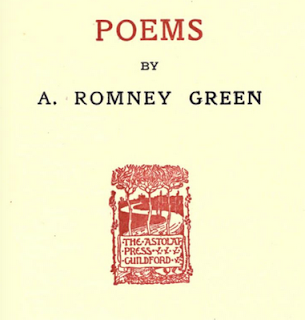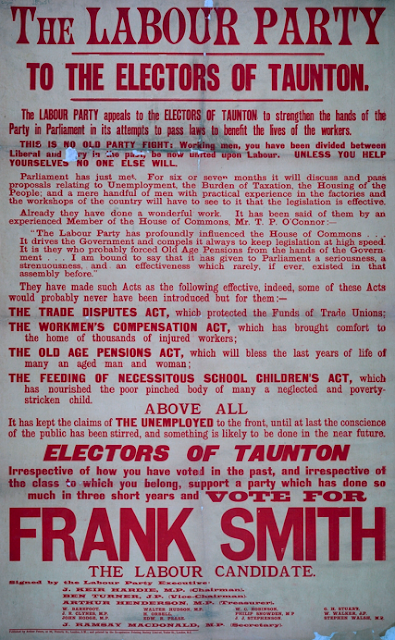As I have written before, Arthur Romney Green was one of the founding members of Haslemere's Independent Labour Party. He established this group with his friend Harold Murray.
Susan Elkin writes "Harold Murray, a dentist, and his wife Bertha were socialists who had arrived at Haslemere with their two children not long after the Green's move there. Green, wanting to be active to their cause, was instantly drawn to them...
"Green and Murray started an Independent Labour Party (ILP) group which met in the showroom above Green's workshop. Sometimes as many as 40 or 50 people attended the meetings: a mixture of small tradesmen, artisans, the men who worked for Green and, sometimes, a sprinkling of local bigwigs. Speakers came down from London, including Henry Golding who became a close and dear friend to Green. They even organised a debate in Haslemere Town Hall between Ramsay MacDonald and John St Loe Strachey, editor of
The Spectator. This, they believed, was the first important debate on socialism to be hold outside London." (
Life to the Lees, Natula Publications, 1998).
 |
Debate on Socialism, 1908,
Ramsay MacDonald and John St Loe Strachey,
Haslemere Branch of the Independent Labour Party
|
The booklet recording the debate says that it was held in the School Hall, not Haslemere Hall as Elkin states. It is interesting to see the booklet is published "by the Haslemere Branch of the Independent Labour Party, King's Road, Haslemere", so the recorded address for the branch would have been Arthur Romney Green's workshop on Kings Road.
The debate was "arranged under the joint auspices of the Haslemere branches of the Independent Labour Party and the Church of England Men's Society" which seems like an interesting combination of societies. Presided over by the Lord Bishop of Dorking, MacDonald and Strachey were accompanied on the platform by "Mr Harold Murray (chairman of the Haslemere branch of the Independent Labour Party), the Rector of Haslemere (the Rev. G. H. Aitken)" and others. The Rev. Aitken was the vicar of St Christopher's Church described as "the guiding spirit behind its creation". This working relationship between the Independent Labour Party and the Church of England, placing Green's friend and the vicar of St Christopher's together is the closest link I have found between the Peasant Arts movement and St Christopher's Church. Arthur Romney Green is likely to have been on the platform also, as it is noted that there were other representatives of the Independent Labour there, but he is not separately named.
Whilst I have read of this debate being held in 1908, I had not seen the subject of the debate before:
"That the only way to arrive at a just economic basis of Society, is by the application of the principle of collective ownership and control of land and capital"
Ramsay's first speech of the evening sets out a main theme "I am therefore going to consider to-night the question of
distribution, the social distribution of wealth, the economic basis of society
judged from its results in the distribution of wealth. Now my proposition in connection with
that is that existing distribution is absolutely unjust, and by unjust I mean
that it is not in any way the expression of the service given by the owners of
property to society; that you have got men and women owning property to-day who
have given no service to society for the property they own, and that as they
have become possessed of that property owing to the present constitution of
society, it becomes our duty to re-constitute society so that the distribution
of wealth proceeds upon lines or economic and social merit.
"...So by the present system of unregulated capitalism you have
every successful business in the country tending to become over capitalised. The charge of the capitalist is
becoming heavier and heavier and the power of the worker to demand a fair share
of the result of his effective labour is becoming less effective from an
economic and social point of view."
Strachey responds at one point relaying a story of a woman
who had been neglectful of her children saying ““Look here, so long as the
Salvation Army’ll feed my children and look after them I won’t, - so there!” That is the way in which a half and
half Socialism is eating into the fabric of the family and injuring it.”
Harold Murray speaks at the end of the debate, adding “There
is no doubt at all in my mind that some of the points that have been made
against us to-night by Mr Strachey have been made simply because he knows too
few Socialists to be able to appreciate the fact that they cannot have a bad
effect upon Society but only a good one.
All the Socialist I have ever known – and I am a Socialist of
twenty-five years standing – have been exceptionally good men, and I have not
found a bad one amongst them (laughter and applause).”
Rev. G. H. Aitken seconds the motion and is the last speech
of the night recorded. “…I believe
that at this particular moment there is nothing we need more in England to-day
than that we should understand one another. I believe, perhaps that I am voicing the feeling of many
when I say that my whole heart goes with Mr. Ramsay MacDonald. We want, I believe, everything he
wants. We desire that just
economic basis for Society. We
desire that our people should more and more share in the good things given to
us in this beautiful world of ours, and we are ready, not merely to give money
which is the least – I was going to say the worst – way of effecting it, but we
are ready to give our time, our thought and our life in order that we may, put
the best at the disposal of all.
But while we feel that, we are not yet convinced in our heads that this
principle of the collective ownership and control of land and capital is, at
present at any rate, the practical way of doing what we desire. There may be, in some future age, the
possibility of its being realised but of that I know nothing.
"But to-night what I seem to
see here is the spirit of the age standing up and calling the banns of marriage
between Knowledge and Love. When
Knowledge and Love are united in holy wedlock in this land of ours – I do not
profess to be a prophet, and I do not say what the off-spring will be, but I am
perfectly certain that the off-spring will be what it ought to be, for the good
of the whole of this nation. And
until Knowledge and Love are so united, we cannot have that ideal State for
which we all long and which we are all trying, I hope, in our little ways, to
work for."



























